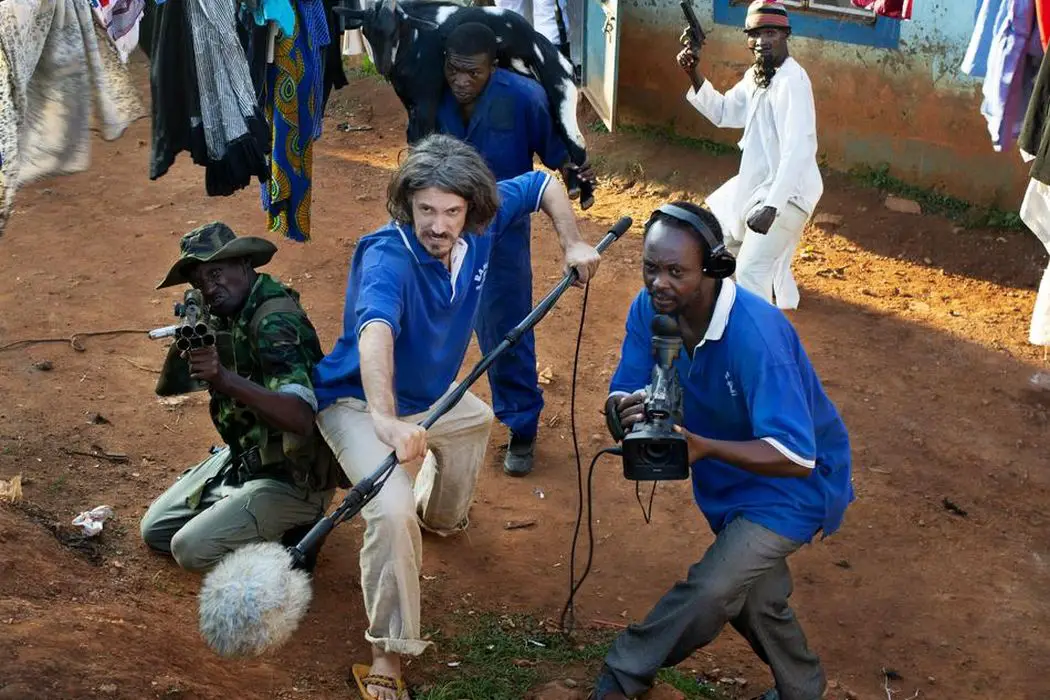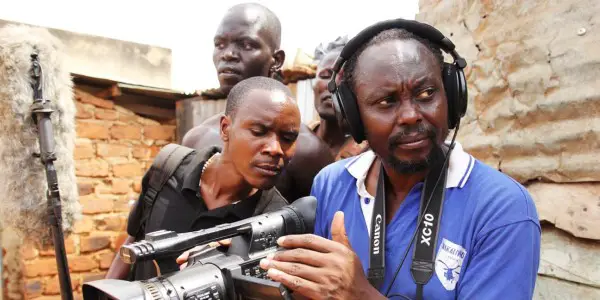SXSW 2020: ONCE UPON A TIME IN UGANDA: Wakaliwood Forever!

Musanna Ahmed is a freelance film critic writing for Film…
Wakaliwood, the home of the super best action movies, directed by Ugandan auteur Isaac Nabwana (also known as Nabwana I.G.G.). But I don’t need to tell you this – VJ Emmie, the MC who peppers Nabwana’s ultra-low-budget gonzo action movies with jokes and hilarious observations, can hype you up way better than I can even try. The unique aesthetic of films such as Who Killed Captain Alex? and Bad Black is magnetic – both films are available on YouTube – but what makes these films so special to the cult audience isn’t something explored in this documentary.
A mostly successful documentary
Whilst Once Upon a Time in Uganda doesn’t necessarily need to investigate the appeal of Nabwana’s idiosyncratic cinema from an analytical perspective, it would certainly help in broadening the interest in Wakaliwood to the uninitiated and the doubtful, a goal that Nabwana sets out to do throughout this documentary with the help of his mzungu partner Alan Hofmanis, who takes on the duty of promoting Wakaliwood in the international space as well as starring in the movies.

Besides the missed opportunity to discover why Wakaliwood resonates with the world (which is also partly due to a lack of film clips shown), this is a film that otherwise does everything right. This is a wonderful observational piece on one of the most important film operations in the world, a machine that mobilises the lower-class community of the Wakaliga slum in Uganda’s capital. In their own country, these folks don’t get the respect they deserve.
Hofmanis, formerly a film programmer in New York, dropped everything in his life to move to Uganda and track down Nabwana after being sold on the trailer for Who Killed Captain Alex? There’s a crafty recreated sequence which follows Hofmanis tailing a man wearing a Ramon Film Productions (the name of Nabwana’s studio) shirt and then chases him to track down the auteur.
Acquaints us with the historical and political context
The recreation is one of many stylistic flourishes and a great way for director Cathryne Czubek and co-director Hugo Perez to depict key moments that they weren’t around for in the journey of Hofmanis and Nabwana, whose creative synthesis has transformed Wakaliwood into an international phenomenon, playing at global film festivals. Watching film clips would have been nice but watching the reactions from audiences in cinemas around the world is heartwarming itself.

We learn about the impact of Nabwana’s youth in Idi Amin’s Uganda and how Chuck Norris, Bud Spencer and Sylvester Stallone were amongst the screen heroes who provided an escape for Nabwana and subsequently inspired the sort of cinema he set out to make. We learn about the socioeconomic differences between Ugandan elites and the slum populations and how the corporate class kowtows to the white man, another aspect which shapes the auteur’s movie-making process.
As a white man, Hofmanis is a crucial presence even if he wasn’t doing anything on the business side, for it’s the subversive, anti-heroic ways in which he performs as the sole white actor in Nabwana’s movies that makes them distinct from the product of a big media company. When such corporations come knocking at Isaac’s door once he tastes viral success, there’s a sense that, whilst he might get the financial support he dearly needs, he might also lose his artistic freedom, which becomes the point of conflict for himself and Hofmanis.
Making the most of great access
When the tensions mount between the two figureheads, the documentary crew are present at many of the right times, leading to lots of great actuality and a solid emotional hook before the uplifting third act. The filmmakers are so well embedded, earning access into even the one-on-one meetings between Hofmanis and Nabwana, sitting in a taut personal meeting where we see the two discuss their creative differences, in addition to sitting down for interviews with the main characters including Isaac’s wife and collaborator Harriet.
What also makes this documentary an interesting viewing experience is the resources that the filmmakers have, which gives the doc a shine that feels at complete odds with the pocket change look of Wakaliwood. This is a very polished picture but the great ability of the producers, earning the trust of this community and even playfully involving them with creative green-screen and drone shots, fends off any potential accusations of exploitation.
Once Upon a Time in Uganda: Conclusion
Wakaliwood is so well documented and there’s even a whole segment dedicated to the international news crews who come in and out – one of the great moments is back in New York City when Alan and his mum pick up an issue of Playboy from a puzzled newsagent, and open it up to see four-page feature on Wakaliwood. Consequently, for those who have followed this story over the years, this documentary might just feel like it covers a path they’ve already been on.
But the hook of this documentary isn’t so much the story of Wakaliwood but rather the personal insights from the people who make it up, from understanding Nabwana’s ambitions and fears for the industry to understanding the secrets of their great prop maker. Once Upon a Time in Uganda is a nice supplement to the ongoing, exciting story of Wakaliwood and the perfect thing to tie us over whilst we wait for their next awesome movie.
Once Upon a Time in Uganda was originally planned to premiere at SXSW 2020. For more information on the film, click here.
Does content like this matter to you?
Become a Member and support film journalism. Unlock access to all of Film Inquiry`s great articles. Join a community of like-minded readers who are passionate about cinema - get access to our private members Network, give back to independent filmmakers, and more.
Musanna Ahmed is a freelance film critic writing for Film Inquiry, The Movie Waffler and The Upcoming. His taste in film knows no boundaries.













